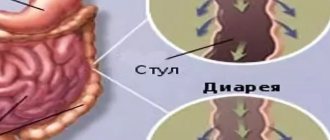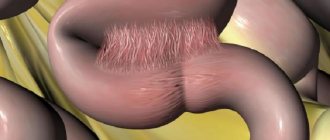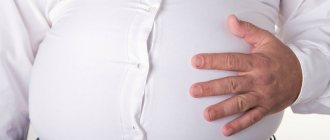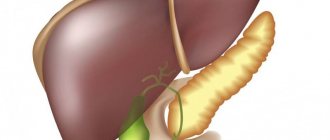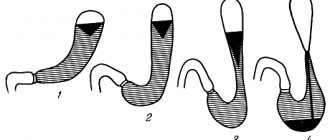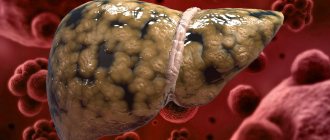From this article you will learn:
- What are the causes of diarrhea in old age?
- What complications does diarrhea cause in the elderly?
- How is diarrhea diagnosed?
- What are the most effective treatments for diarrhea in older people?
- What should be the diet for diarrhea?
- How to cure diarrhea in older people using folk remedies
Age leaves its mark not only on appearance, but also on the functioning of all body systems. From time to time, disruptions in the functioning of various organs and tissues occur, and not only doctors notice them. Diarrhea in older people is one of the most common problems. Let's figure out what causes it and what treatment will help cope with this disease.
Causes of diarrhea in an elderly person
Children and the elderly often suffer from indigestion, as a result of which their stool becomes liquid.
But we must remember that this fairly common deviation is often the cause of dehydration, which can lead to serious negative consequences. Considering that with age, the body's defense mechanisms weaken, and a person is attacked by more and more chronic diseases, diarrhea can be a very dangerous symptom, regardless of the causes of its occurrence. Many people under 50–60 years of age may experience ailments accompanied by loose stools, the cause of which is poisoning with low-quality or stale products, infection or bacteria in the stomach, as well as side effects of medications. In addition to these factors, diarrhea in older people can be caused by age-related changes, which entail disruptions in the functioning of various body systems, including metabolic disorders. The following processes occur during aging:
- A decrease in the level of saliva production, which plays a special role in the digestion of food and facilitates the absorption of nutrients, is the cause of dry mouth. Combined with weakening of the muscles involved in chewing food, this leads to impaired swallowing.
- Inhibition of the fermentation process, resulting in worsening hydrolysis, which in turn provokes diarrhea.
- Due to frequent consumption of sweet, salty or spicy foods, the number of taste buds decreases, which negatively affects the functioning of the gastrointestinal tract.
Loose stools in older people often do not go away for a long time, which can be a symptom of various diseases, for example, pathologies associated with hormonal imbalance or metabolic failure. Thus, diarrhea is often observed in elderly patients with diabetes mellitus or Addison's disease.
Loose stools in old people can occur as a physiological response of the body to fear, during stress, or as a result of nervous strain. As a result of this reaction, metabolic processes are activated, food moves faster through the esophagus, but absorption of nutrients does not occur, the contents of the stomach, including liquid, enter the intestine and are excreted.
This common problem among older people is dangerous because the loss of the amount of fluid necessary to saturate tissues and cells can lead to dehydration of an already weakened body due to age-related changes. However, diarrhea can contribute to the exacerbation of chronic diseases.
The main causes of indigestion and dysfunction of the digestive system in older people are:
- Side effects from medications, such as those that occur when taking antibiotics.
- Diseases of the endocrine system.
- Gastrointestinal diseases.
- Stress and nervous tension.
- Failure to comply with hygiene rules.
- Eating stale or low-quality foods.
- Insufficient chewing of food due to dental problems.
Read material on the topic: Nutrition in old age: the most important recommendations
Age-related changes
With age comes not only experience and wisdom, but also negative signs of aging. Depending on the capabilities of the body, each person, they occur at different times and affect absolutely all organs and systems. In old age, the digestive system of the gastrointestinal tract also decreases in strength and acquires the following features:
- the strength of facial and chewing muscles decreases, as a result of which the ability to fully chew food decreases;
- the esophagus increases in length, its muscle layer is deformed, which makes swallowing difficult, and the risk of hernia formation increases;
- due to a decrease in the number of enzymes, the intensity of food digestion in the small intestine decreases;
- the volume of the stomach decreases, its localization changes from vertical to horizontal, the volume of secreted enzymes and gastric juice decreases, the intensity of motility, metabolic processes and blood supply decreases;
- the intestinal tract’s tendency to so-called “senile constipation” increases, and fecal stones form in it;
- the balance of intestinal microflora is disturbed, an excess of colonies of opportunistic flora occurs over the number of lactobacilli, as a result of which the synthesis of vitamins is disrupted;
- due to a decrease in liver mass and a decrease in its functionality, protein, carbohydrate, and fat metabolism and the rate of drug elimination are disrupted;
- due to an increase in the volume of the gallbladder and thickening of its walls, the secretion of bile into the upper intestines is disrupted, which provokes the formation of stones in this organ;
- a decrease in the number of glandular cells of the pancreas, a decrease in the intensity of blood flow in it reduces the volume of enzymes secreted by the gland.
Due to age-related changes in the digestive system, older people suffer from diseases of the gastrointestinal tract; they need to adjust their diet and diet.
https://youtu.be/eGrW8MGajYQ
Symptoms and complications of diarrhea in older people
Diarrhea may be accompanied by additional symptoms:
- poor appetite;
- dry mouth;
- cutting pain and spasms in the gastrointestinal tract;
- loss of strength and fatigue;
- nausea;
- accumulation of gases in the intestines;
- dark color of urine.
If one of the listed problems or other changes in the functioning of the body is detected, elderly people should immediately consult a doctor.
If diarrhea causes fever, blood in the stool, or acute pain, you need to call an ambulance. Elderly patients have the same weak body as young children, so at the slightest suspicion of deterioration, emergency intervention by specialists is needed. The most common complication due to diarrhea is dehydration, which occurs due to rapid loss of fluid, which entails disturbances in the functioning of all life support systems. Taking into account the low degree of development of the protective mechanisms of old people, as well as the presence of various physiological pathologies, the degree of risk is very high, and in some cases, intestinal disorder can lead to death. Therefore, it is so important to monitor the water balance in the body of older people, and if the skin of the lips is cracked, the mouth feels dry, blood pressure has dropped sharply, or there is no urge to urinate for a long time, it is urgently necessary to replenish the missing fluid. In the case of loose stool in a bedridden elderly patient, in the absence of normal tissue saturation with nutrients, irritation begins, feces corrode the skin, and anal fissures form. To prevent pain and damage to the skin, experts recommend using antiseptics, moisturizing creams, restorative ointments, and not neglecting hygiene procedures. Read material on the topic: Diseases of the elderly
Folk remedies for diarrhea
Elderly people often prefer traditional recipes to medicines. In this case, it is important to remember that without identifying the cause, the problem cannot be solved. Before taking herbal remedies, you still need to see a doctor, undergo an examination and determine the diagnosis.
For the most part, natural remedies are aimed at restoring intestinal microflora, normalizing digestive processes, and relieving inflammation. The most common traditional medicine to combat diarrhea are:
- Infusion of oak bark. It has an anti-inflammatory effect, and also strengthens the stool and stops fluid loss. To prepare the medicine, pour boiling water over a small amount of crushed bark and leave for an hour. Then drink the infusion in small sips throughout the day.
- Strawberry leaves. They help fight infection, strengthen the immune system and have a beneficial effect on the digestive system. Pour a tablespoon of strawberry leaves into a glass of boiling water, leave for 20 minutes, filter and cool. The resulting medicine is taken 50 ml every hour. The course of treatment lasts until the symptoms stop completely.
- Sage. Sage is beneficial for many systems and organs, including the intestines. It is believed that it can normalize hormone levels in the body. An infusion is made from the herb and kept in a thermos for two hours. The medicine is taken in small sips throughout the day.
- Rice water. Boil a couple of tablespoons of peeled brown rice in half a liter of water for 30 minutes. Then filter the water, cool and drink throughout the day. This product strengthens perfectly and prevents the body from losing fluid. It is also suitable for bedridden patients and those who have difficulty chewing.
The basic rule when choosing folk remedies is that they should have a gentle effect on the elderly body. Strong drugs and remedies should be avoided. The likelihood that diarrhea will develop into chronic constipation is very high. Old age requires a special approach to treatment. Otherwise, the body's reaction may be unexpected.
Diagnosis of diarrhea in old age
Before starting treatment for diarrhea, it is necessary to establish the causes of its occurrence. We invite you to familiarize yourself with the most common and effective methods for diagnosing the disease:
- analysis of stool for coprogram;
- culture for bacterial microflora;
- clinical blood test;
- biomarker analysis to identify dysfunctions of internal organs;
- ultrasound examination of the abdominal cavity;
- gastroscopy;
- sigmoidoscopy;
- colonoscopy.
Only after a comprehensive study of the data obtained during the examination, a therapist or gastroenterologist will prescribe the necessary treatment.
Read material on the topic: What does an examination of an elderly person include?
Treatment methods
If an elderly person has a bowel disorder, it may be due to various diseases of internal organs and systems. In the case of bloody stools, bleeding occurs inside the body. The cause may be dysentery and salmonellosis, or the opening of ulcers, rupture of hemorrhoids. Diabetes mellitus, Crohn's disease, poor nutrition, and poor hygiene provoke the formation of loose stools. For effective treatment, it is necessary to find out the cause of the disease and direct therapy to it. First of all, the patient should follow some rules:
- dietary nutrition is indicated;
- prevention of dehydration is achieved with the help of special medications (for example, Regidron), large amounts of water, jelly, herbal teas;
- therapy with antibacterial drugs prescribed by a doctor is necessary;
- medications that correct the production of enzymes and also help break down food;
- it is necessary to restore electrolyte balance;
- tablets are required to improve intestinal motility, which will form feces.
Loperamide is indicated to restore intestinal motility. Smecta, activated carbon, and Polysorb are recommended as sorbents that remove toxins from the body. After an antibiotic course, probiotics are required - Linex forte, Hilak forte, bifidumbacterin. Traditional methods are widely used (rice broths, cereal porridges, berry jelly, herbal infusions). Comprehensive treatment will relieve an elderly person from a serious illness and prevent complications.
Drug treatment of diarrhea in older people
It is important to remember that if you seek medical help in a timely manner, indigestion can be successfully treated. In particular, your doctor may prescribe various medications for diarrhea in older people. A comprehensive examination will help identify the causes of the disease and determine the most effective drugs for treatment. Based on the data obtained, the doctor will draw up an individual therapy program for the patient, which will take into account the nature of the pathology and the characteristics of the old man’s body. However, there is one rule that must be followed whenever signs of diarrhea appear: it is important to prevent dehydration, which is dangerous for anyone. Normal functioning of the gastrointestinal tract is possible only if the water-salt balance is maintained. Due to the influence of various factors, it is especially important to control the content of salts and fluids for elderly people. Regidron, a medicine that includes the above-mentioned elements and minerals, will help solve the problem of replenishing fluid, sodium, potassium and chlorine in the required quantities. The drug is available in individual vacuum bags. To prepare a medicinal solution, the powder must be diluted in one liter of boiled water. "Regidron" should be taken throughout the acute period of the disease at intervals of several hours according to the recommendations of the attending physician. Stop using the product only after diarrhea has completely stopped. An analogue of "Regidron" is the drug "Citroglucosolan".
- Recommended articles to read:
- Social services for older people
- Diseases of old age
- Valuable tips on how to choose a boarding house
To remove toxins, harmful bacteria and microbes, it is recommended to use sorbent agents. Currently, the most popular sorbents are activated carbon, smecta and some others. Taking this group of drugs should be short-term, since along with toxins they also remove beneficial substances necessary to saturate cells and tissues. Therefore, it is very important to strictly adhere to the specialist’s recommendations regarding the daily dose and duration of treatment.
If diarrhea in older people is a symptom of cancer, sorbent drugs will not help get rid of the cause of indigestion, therefore, their use is not justified. The use of drug therapy to alleviate the patient's condition may not always lead to the desired result. Moreover, any medication has a number of contraindications and side effects. For example, diarrhea in older people after a stroke, which causes multiple organ problems, usually cannot be treated with pharmaceuticals. In such cases, traditional medicine comes to the rescue. A diet for diarrhea is a good way to get rid of the disease, while the risk of harming the body is reduced to zero. Proper nutrition is recommended by doctors as an integral element of a complex of therapeutic measures.
Basic tips for developing menus during diarrhea:
- During the first 24 hours from the onset of the disease, you need to drink only clean water, compotes, herbal tea, combining them with drugs that prevent dehydration of the body. In this case, you should completely stop eating.
- If there is no deterioration, you can have a small snack on the second day. Food should be easily digestible and not cause the formation and accumulation of gases in the stomach. You can eat a baked apple, crackers without adding salt, spices or sugar, rice or oatmeal, and steamed vegetables.
- No earlier than two or three days later, you can try to diversify your diet by adding boiled or steamed lean dietary meat, such as chicken or rabbit.
- As the patient recovers and improves, vegetable soups and broths in second water can be gradually introduced. It is necessary to choose only lean meat that does not cause allergic reactions.
- Over the next few days, you can try using low-fat kefir and cottage cheese. Only natural products without added dyes, thickeners or flavors are allowed.
- New foods should be introduced into the diet during the recovery period gradually, at intervals of one or two days, so as not to irritate the already injured stomach.
Read material on the topic: Health of older people: how to strengthen
Dietary rules for diarrhea and during recovery
Chronic diarrhea is not a reason to refuse food. The body requires strength and nutrients more than at other times. However, you need to eat right, without overloading the intestines, so as not to provoke a backlash.
If diarrhea is acute and severe, it is important to drink more in the first day. During this time, it is better to refrain from eating. Treatment needs to start as early as possible, stop signs of dehydration, and stabilize intestinal function. From the second day you need to start eating, following a diet.
Nutrition for diarrhea in older people includes:
- Porridge. It is best to choose whole oat and rice cereals. Rice strengthens well and helps stop diarrhea. If lactose is poorly absorbed, boil them in water. Such food is nutritious and safe for intestinal disorders.
- Potato. It contains starch, which also strengthens and helps stop loose stools. You can eat boiled, baked potatoes, mashed potatoes. Fried potatoes and french fries are not allowed.
- Dairy products. They are added to the diet gradually. For the first few days, it is better to avoid eating yoghurt and kefir. They can increase intestinal motility. These foods should be eaten in moderation.
- Vegetables and fruits. It is better for older people to generally avoid eating them raw. You can eat pureed vegetables, stews, baked apples, jams. Raw fruits cause diarrhea.
- Soups. It is recommended to eat puree soups. The broth must be vegetable or meat secondary. Only lean meats: chicken, turkey. You should not add cabbage, beets and other vegetables that increase gas formation.
For diarrhea in older people, the diet should include a variety of foods. You should not eat only cereals or crackers. During diarrhea, the body lacks vitamins and minerals. Their deficiency is replenished with food, so the diet is thought out to the smallest detail.
Drinking plenty of fluids plays a special role. It is necessary to drink 2 liters of clean water per day. But you can also drink sweet black tea; it stops diarrhea quite well.
Proper nutrition for older people with diarrhea
It is especially important for older people to monitor their diet, excluding unhealthy and, especially, prohibited foods from the menu.
Sometimes it is necessary to follow a special diet. This, of course, is not about the goal of losing excess weight, but about a diet that promotes normal digestion for an elderly person. A specially compiled list of products will help prevent various diseases, including getting rid of diarrhea. For nutrition, a variety of foods are suitable that are easily digestible, do not cause increased gas formation, and contain vitamins and microelements. It is especially important to eat foods rich in iron, potassium and calcium. At the same time, due to lower energy consumption compared to the younger generation, it is worth eating less in calories. Let's take a look at the foods that are recommended for consumption and those that, on the contrary, should not be eaten by older people. So, the diet of an elderly person can include:
- Vegetable oils – corn, soybean, sunflower.
- Low-fat meat products - poultry.
- Eggs (white).
- Low-fat dairy and fermented milk products.
- Soups with vegetable, fish or chicken broth.
- Low-fat fish.
- Seafood.
- Whole grain cereals (except rice).
- Vegetable and fruit salads.
- Beef liver.
- Whole grain bread.
- Compotes and fruit drinks.
- Tea.
- Chicory (instead of coffee).
The following foods should be excluded or limited:
- Fatty meats.
- Yolks.
- Dairy and fermented milk products high in fat.
- Flour products.
- Rice.
- Products with high sugar content.
- Carbonated drinks.
- Beans.
- Fried and smoked products.
- Spices and salt.
- Hot sauces, etc.
Read the material on the topic: Nutrition for the elderly: recommendations and sample menu for the week
ethnoscience
Loose stools are usually treated with medications, but in the case of older people they are not always effective, since not all drugs can be used for them. This treatment should also be discussed with your doctor.
The most effective remedy for diarrhea, even when the discharge is bloody, is considered to be powder made from dried films of chicken ventricles. This powder should be taken 2-3 times a day, 1 teaspoon with liquid. Rice water and infusion of chamomile flowers are also considered good remedies. But before using such methods, you should consult your doctor. This treatment also requires a diet.
In what cases should you consult a doctor?
Medical assistance is necessary in case of severe dehydration. If, against the background of diarrhea, symptoms such as darkening of the eyes, short-term fainting, loose stools with blood, lack of urination and a lethargic state are observed, leading to severe depression, then you should immediately call an ambulance.
Only a doctor is able to make the right decision about therapeutic care based on the patient’s diagnostic data. Self-medication in this case can lead to negative consequences and complications.
Diarrhea occurs much more often in older people than in younger people. This is due to the wear and tear of all systems and organs and the inability to fully assimilate food. Food is rejected by a weak intestine and diarrhea occurs. Symptoms of an upset intestine should be treated by giving up your usual diet and taking medications. To avoid serious complications, you need to follow the daily regimen prescribed by your doctor and eat properly, drinking sufficiently large quantities of water.
Quite often, diarrhea in an elderly person is not taken seriously by either himself or his family. If you ignore these manifestations, you may miss the onset of a serious pathology, which will significantly worsen the quality of life of elderly men and women.
Nutrition
For intestinal disorders, older people first need to adjust their diet. A specific diet should be followed, which is approximately based on the following fundamental principles:
- On the first day of diarrhea, you should completely stop eating food. The stomach and intestines should rest during this time. But to avoid dehydration, you should drink as much water or other liquids as possible. Liquid jelly, compotes, teas, herbal decoctions and juices are suitable for these purposes. Freshly squeezed citrus juices are especially useful.
- The second day should consist of easily digestible foods that eliminate flatulence and fermentation in the intestines. It is recommended to prepare mashed potatoes, bake vegetables and eat crackers based on natural bread without chemical additives.
- In subsequent days, you should gradually expand your diet. You can already include chicken breast, rabbit meat and steamed foods. Soups should consist mainly of vegetables to cleanse the stomach and improve intestinal microflora.
- It is better not to consume fermented milk products in the first 3 to 5 days. On the fifth day, you can eat cottage cheese, kefir and natural yogurt.
- After diarrhea stops, you should continue to drink clean water. In the first week after recovery, drink at least 2 liters of water per day for preventive purposes.

